Introduction
As the landscape of clinical trials continues to evolve, Paraguay has emerged as a promising destination for Medtech research. With a regulatory framework that is increasingly aligning with international standards, the country offers both local expertise and a growing patient population, making it an attractive site for innovative clinical studies. However, navigating this environment presents unique challenges, particularly for Medtech startups that may face resource limitations and recruitment hurdles.
This article delves into the critical factors for selecting a Contract Research Organization (CRO) in Paraguay, evaluating their track record, understanding cost structures, and establishing effective communication practices. By examining these elements, stakeholders can enhance their chances of successful trial outcomes in this burgeoning market.
Understanding the Clinical Trial Landscape in Paraguay
Paraguay is progressively acknowledged as a beneficial place for carrying out research, especially in the Medtech field. The nation's governance structure is evolving, with a focus on aligning with international standards, thanks in part to the efforts of organizations like bioaccess®.
Key oversight organizations, such as the National Directorate of Medicines and Food (DINAMED), manage the approval process for research studies, ensuring adherence to ethical standards and safety protocols. Moreover, the presence of skilled investigators and an expanding patient population make Paraguay an appealing location for research studies.
However, Medtech startups often face challenges such as limited financial resources and prolonged subject recruitment timelines, which can impede their progress. Comprehending these dynamics is essential for choosing a CRO like bioaccess® that not only navigates the compliance environment effectively but also utilizes local expertise to enhance study outcomes.
Bioaccess® provides customized services that tackle these challenges, including:
- Regulatory approval assistance
- Research site activation
- Effective subject recruitment strategies
This is particularly important considering collaborative efforts, like the partnership between Greenlight Guru and bioaccess™, focused on speeding up Medtech advancements and studies throughout Latin America, emphasizing the pressing need for a solution-oriented strategy in the area.
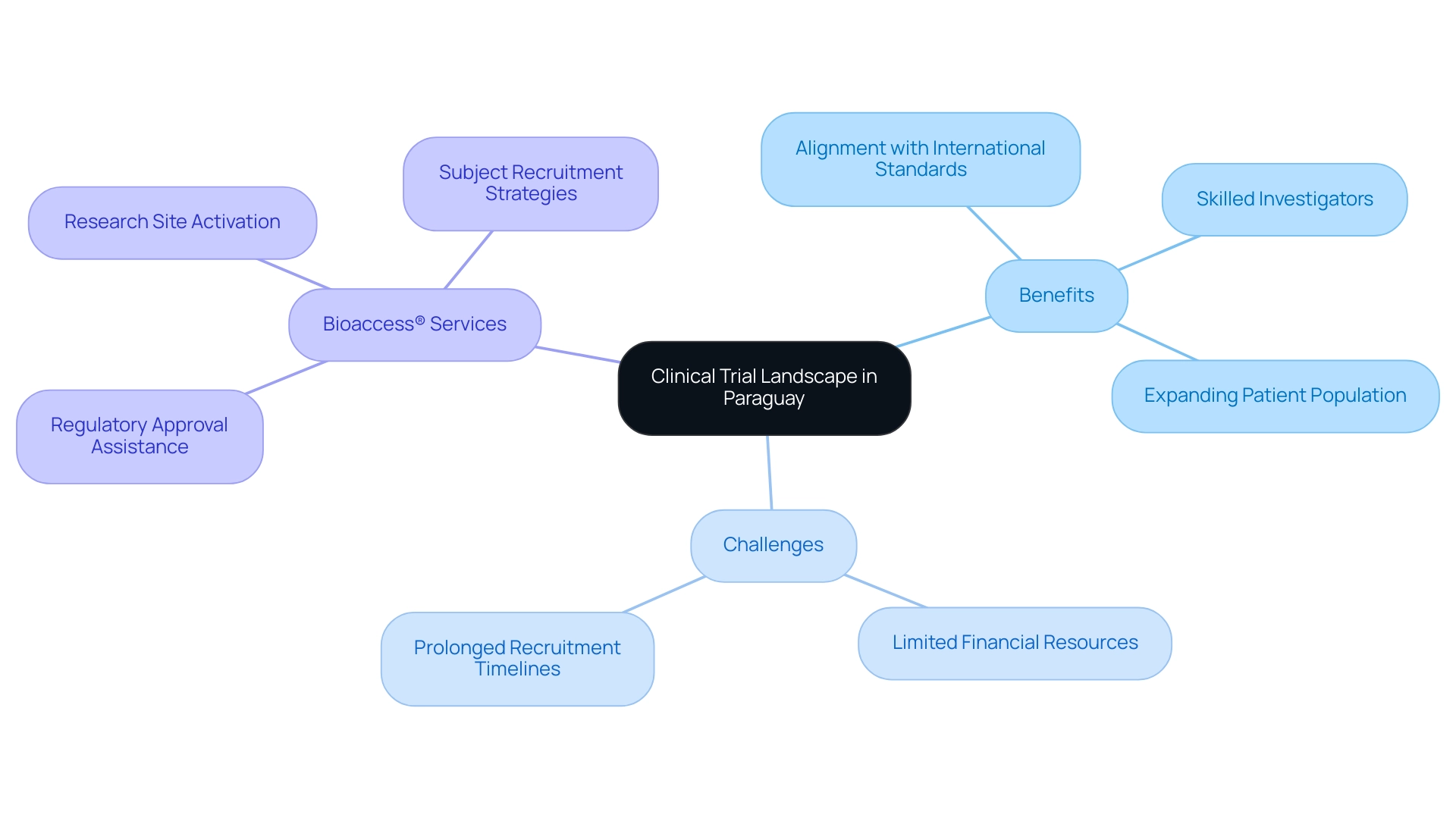
Key Criteria for Selecting an Experienced Medtech CRO
When selecting a Medtech CRO in Paraguay, consider the following key criteria:
- Regulatory Knowledge: Ensure the CRO has a thorough understanding of local regulations, including the approval process for clinical studies and compliance with ethical standards. This knowledge is critical for navigating the complexities of the regulatory landscape.
- Experience in Medtech Studies: Look for a CRO with a proven track record in managing Medtech studies, such as Early-Feasibility Studies, First-In-Human Studies, and Post-Market Clinical Follow-Up Studies. Their experience will be invaluable in addressing the unique challenges associated with medical technology studies.
- Quality of Staff: Assess the qualifications and expertise of the CRO's team. A knowledgeable and skilled team is essential for maintaining the quality and integrity of the research.
- Patient Recruitment Capabilities: Evaluate the CRO's ability to recruit and retain study participants. Given the prevalent challenges in patient recruitment for medical device studies, a strong recruitment strategy is vital for meeting enrollment timelines and ensuring diverse representation.
- Technological Infrastructure: Investigate the technological capabilities of the CRO, including data management systems and electronic data capture tools. Robust technology can enhance the efficiency and accuracy of data collection and analysis.
- Specific Services: Ensure the CRO provides essential services such as import permits and nationalization of investigational devices, along with review and feedback on study documents to comply with country requirements.
By thoughtfully considering these criteria, you can identify a Medtech CRO in Paraguay that aligns with your research objectives and enhances the likelihood of successful study outcomes. Utilizing expertise from leaders such as Katherine Ruiz, who has extensive regulatory knowledge and experience in the field, can further assist your endeavors in navigating the complexities of medical device clinical studies. To discuss your needs further, BOOK A MEETING.
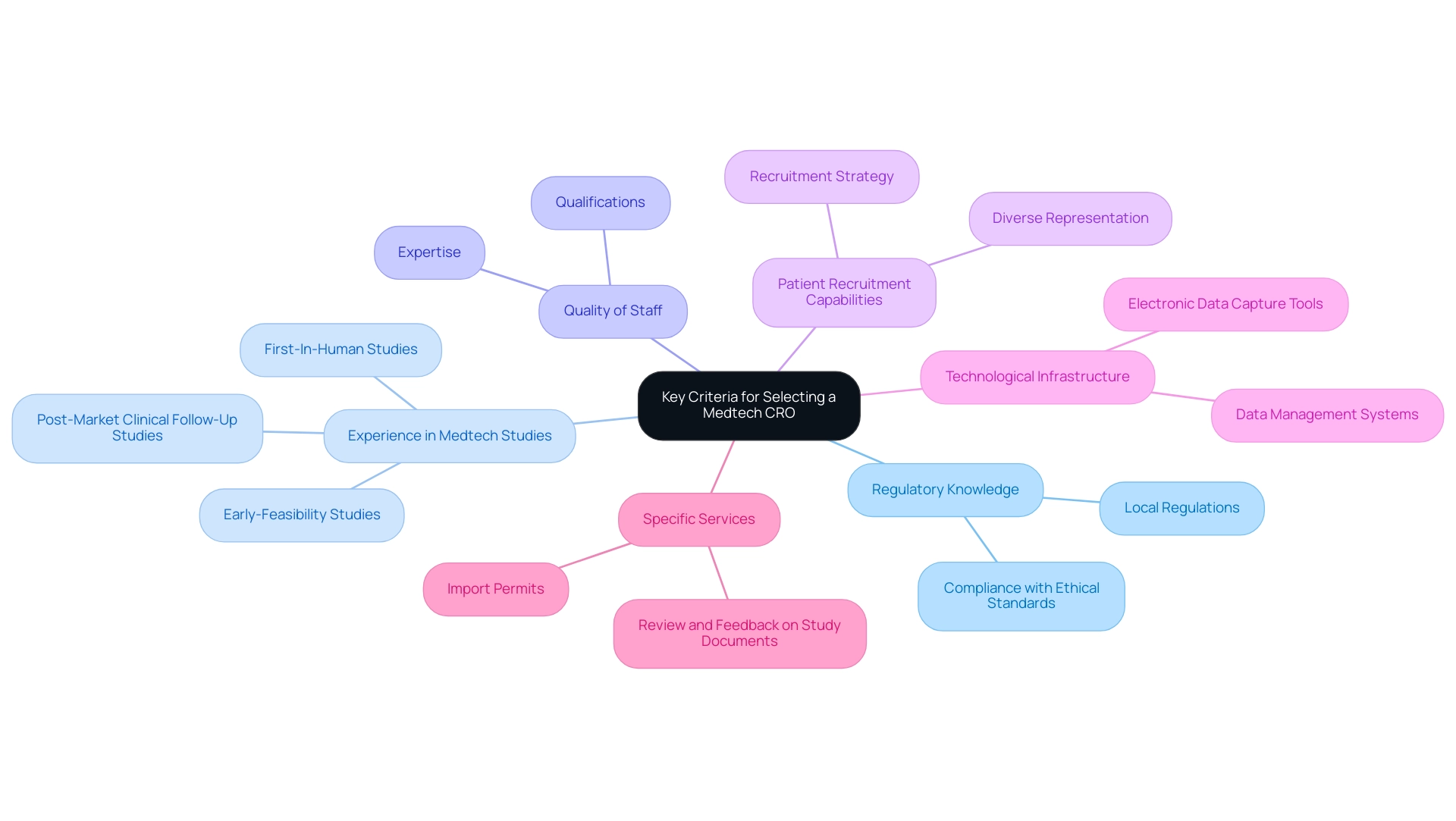
Evaluating the CRO's Track Record and References
To evaluate a CRO's track record:
- Request Case Studies: Ask the CRO to provide case studies of previous Medtech studies they have managed, such as ReGelTec's successful Early Feasibility Study on HYDRAFIL™ for treating chronic low back pain in Colombia. This will give you insight into their experience and the outcomes they have achieved, including notable success rates and patient feedback.
- Check References: Contact previous clients to inquire about their experiences with the CRO. For instance, Dushyanth Surakanti, Founder & CEO of Sparta Biomedical, shared, "Our collaboration with bioaccess® during its first human trial in Colombia was seamless and effective, significantly enhancing our trial's efficiency." Ask about the CRO's communication, adherence to timelines, and overall performance.
- Review Performance Metrics: Inquire about key performance indicators (KPIs) the CRO uses to measure success. This could include metrics related to patient recruitment rates, such as GlobalCare Clinical Trials' achievement of over 50% reduction in recruitment time and a 95% retention rate, which underscores their operational effectiveness, data quality, and compliance with regulatory requirements.
- Assess Publications and Presentations: Look for any publications or presentations by the CRO in reputable journals or conferences. Significantly, Dr. John B. Simpson of Avinger, Inc. mentioned, "Conducting OCT-guided atherectomy research in Cali, Colombia, with bioaccess was a pivotal experience that highlighted their dedication to quality and innovation." This can indicate their level of expertise and contributions to the field.
By thoroughly assessing a CRO's history and references, you can gain confidence in their capacity to effectively oversee your research study.
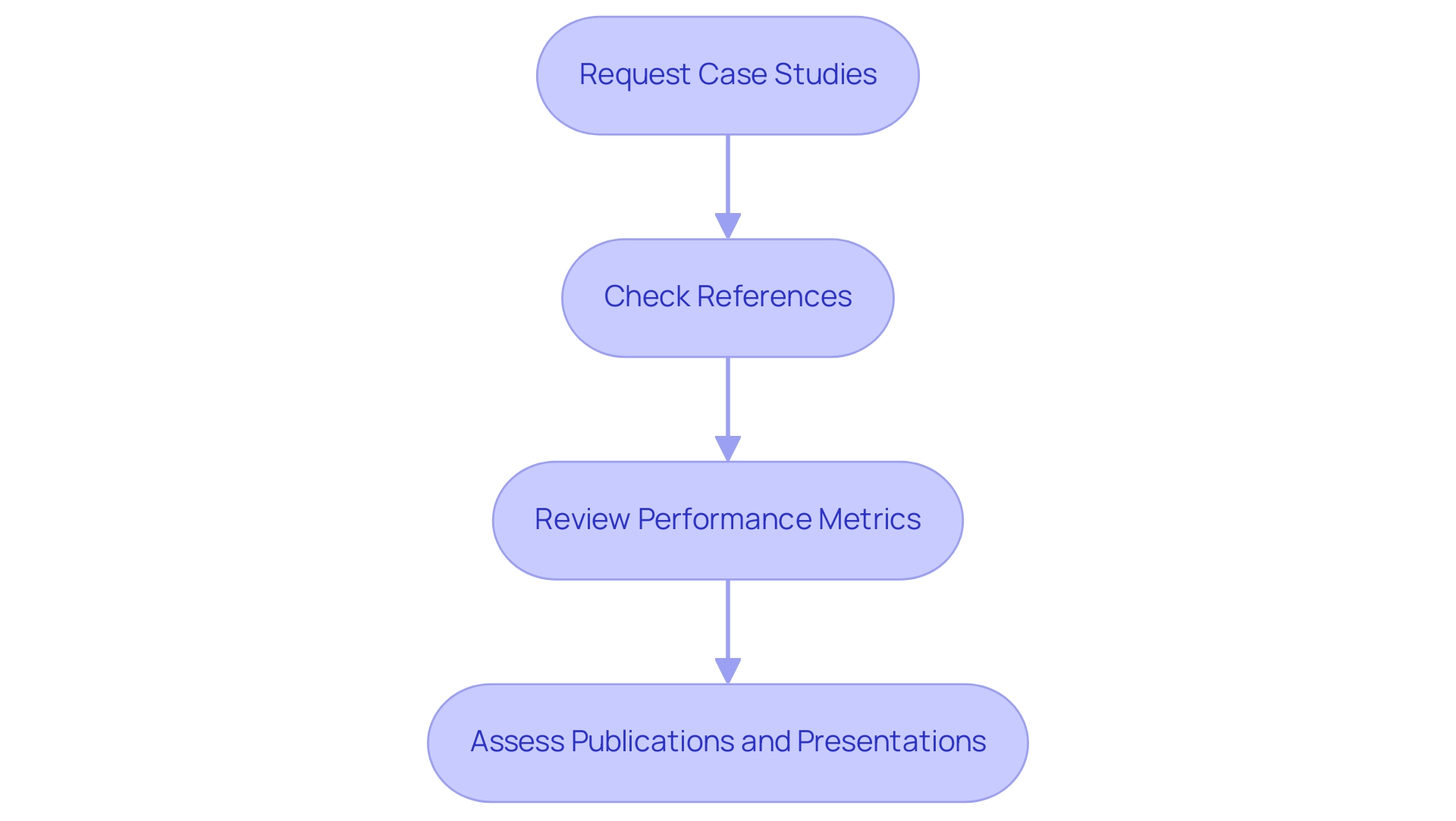
Understanding the Cost Structure of CRO Services
When evaluating the cost structure of Contract Research Organizations (CROs), it is essential to consider several critical factors, particularly in light of the comprehensive services they offer:
- Pricing Models: Familiarize yourself with the various pricing models employed by CROs, which may include fixed-price contracts, cost-plus contracts, and fee-for-service arrangements. Each model presents unique advantages and disadvantages that can impact the overall budget and project management. For instance, the choice of pricing model may influence how costs related to services such as import permits and nationalization of investigational devices are managed. According to recent reports covering the period from 2024 to 2030, the adoption of hybrid pricing models is on the rise, offering flexibility and risk mitigation for complex projects.
- Inclusions and Exclusions: It is crucial to clarify which services are encompassed within the quoted price. Some CROs offer comprehensive packages that include feasibility studies, site selection, compliance evaluations, study setup, and import permits, while others may bill separately for particular services, such as monitoring, data management, or compliance matters.
- Additional Costs: Stay vigilant regarding potential extra costs that could arise throughout the clinical study process. These can encompass compliance fees, patient recruitment expenses, and site management costs, all of which can significantly affect the overall financial scope of the project. Recent trends suggest that biotechnology firms are increasingly encountering unexpected costs during testing. Understanding these potential costs can help mitigate budget overruns. Significantly, numerous biotechnology firms are performing initial-stage studies in Australia to take advantage of its beneficial oversight advantages, which can also positively influence the cost framework.
- Negotiation: Engaging in negotiations over pricing and terms with the CRO is a vital step. Many organizations recognize the need for flexibility and are often willing to collaborate with clients to establish a pricing structure that aligns with their budgetary requirements. As Brian Moore, VP at NICCA USA, Inc., noted, > The quality of research they have done for us has been excellent; this highlights the importance of balancing cost with quality. Moreover, grasping the particular services offered can impact negotiation tactics, as clients might aim to modify the range of services to better suit their financial means.
By comprehensively understanding the cost framework of CRO services, including their broad abilities in feasibility assessments, project oversight, compliance, import permits, and nationalization of investigational devices, you will be more prepared to make informed choices that align with your financial resources while ensuring the quality of research essential for your studies.
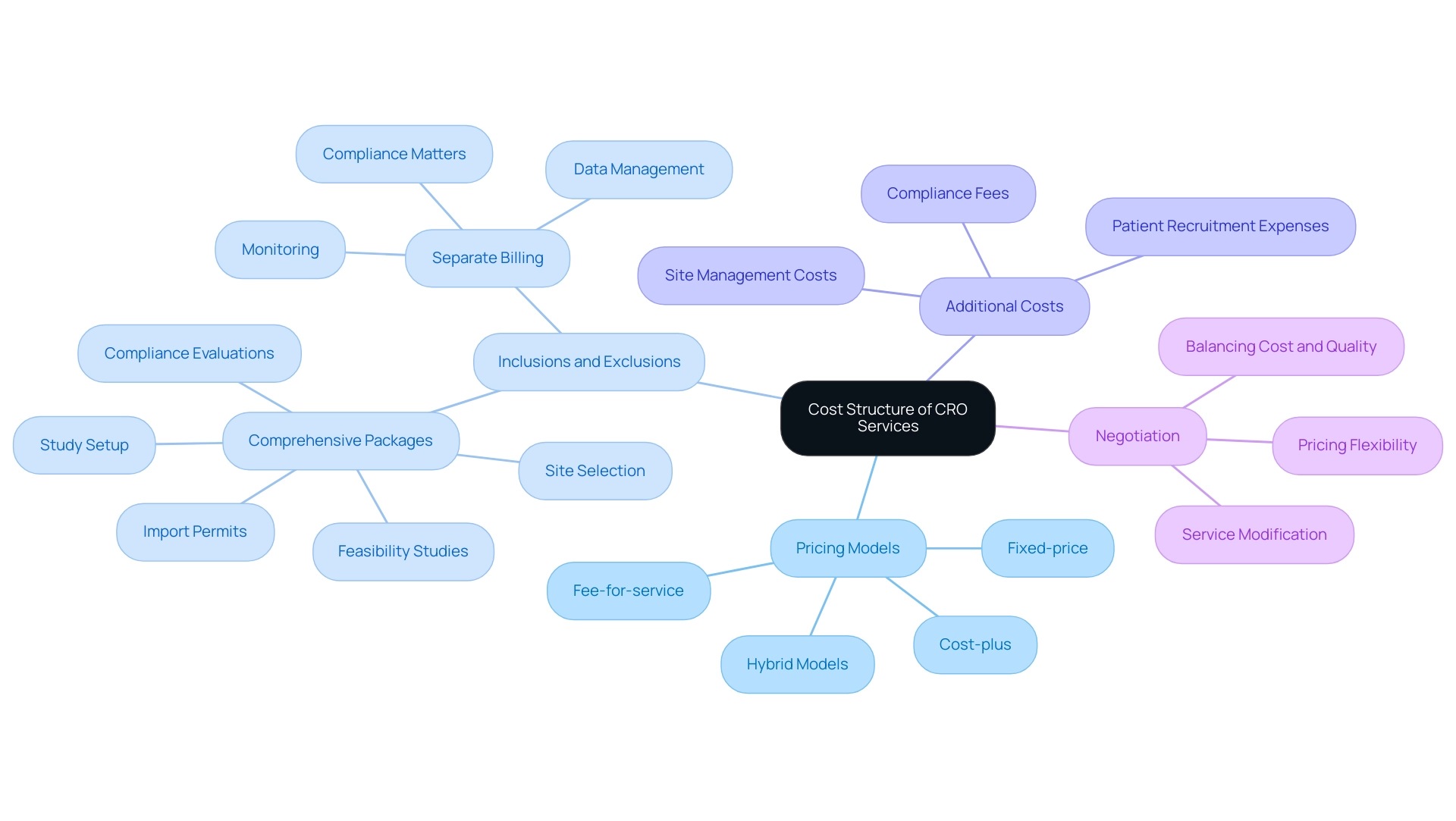
Establishing Clear Communication and Collaboration Practices
To establish effective communication and collaboration practices with your chosen CRO, such as bioaccess™, which specializes in comprehensive clinical study management services including feasibility studies, site selection, and regulatory compliance:
- Define Communication Channels: Clearly outline the preferred communication channels (e.g., email, project management tools, regular meetings) to be used throughout the process, especially considering the need for compliance reviews and documentation as emphasized by Oswaldo Amaya, MD.
- Set Regular Check-Ins: Schedule regular check-in meetings to discuss progress, address concerns, and make necessary adjustments. This fosters accountability and keeps everyone informed about crucial elements of the process, from site selection to reporting and monitoring procedures.
- Document Everything: Maintain thorough documentation of all communications, decisions, and changes made during the process. This ensures a clear record for reference and accountability, which is vital when dealing with Regulatory Affairs and commercialization processes.
- Encourage Feedback: Create an environment where team members feel comfortable providing feedback and raising concerns. Open lines of communication can lead to better problem-solving and innovation, enhancing the overall success of your trial efforts.
By prioritizing clear communication and collaboration, and leveraging the specific services offered by bioaccess™, you can enhance the efficiency and success of your clinical trial, ensuring that all parties, including the CRO and your research team, are aligned and working towards the same goals.
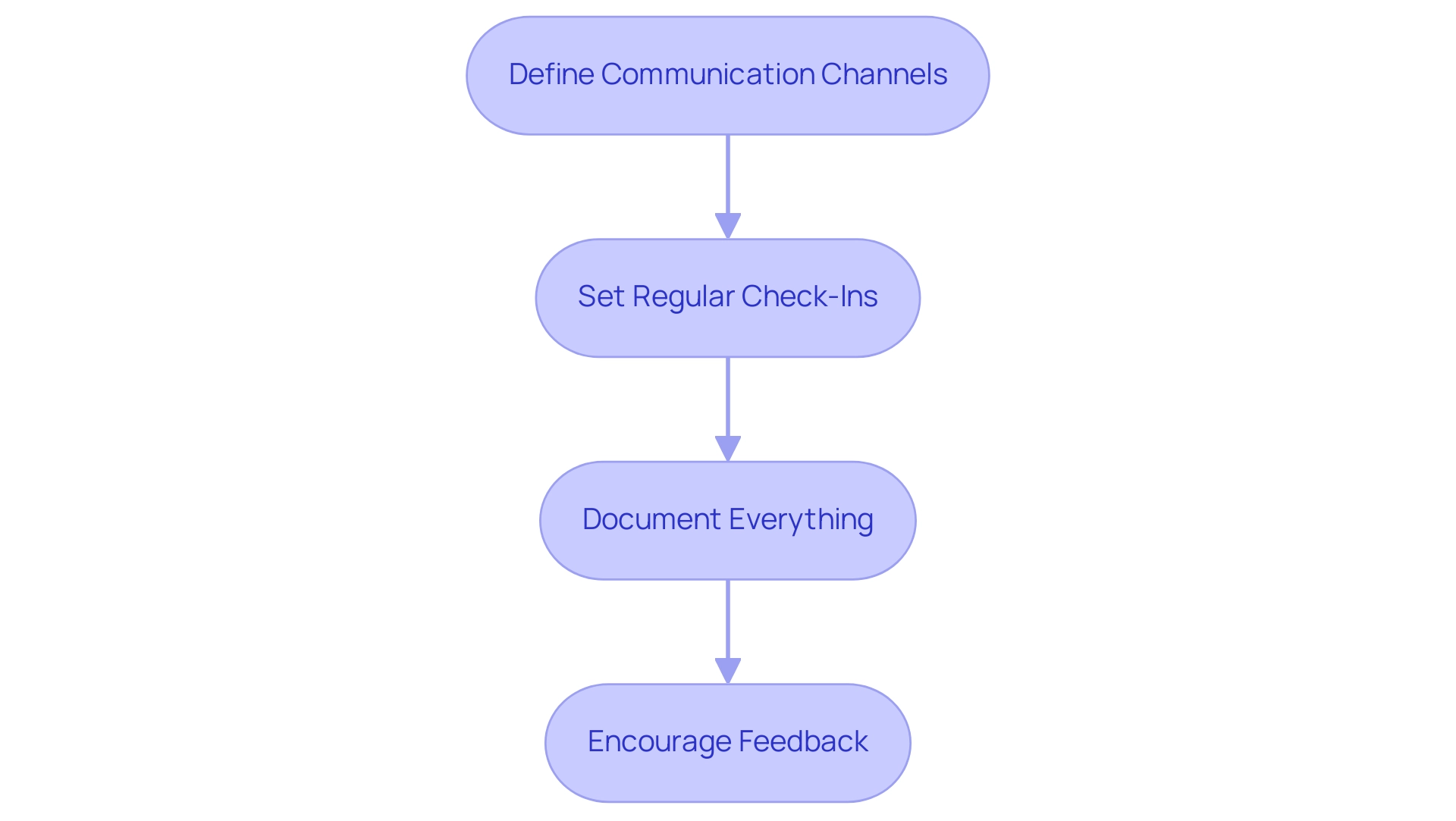
Conclusion
The clinical trial landscape in Paraguay presents a wealth of opportunities for Medtech research, driven by an evolving regulatory framework and a growing patient population. Selecting the right Contract Research Organization (CRO) is paramount for navigating this environment. Key considerations include the CRO's regulatory knowledge, experience with Medtech trials, staff quality, patient recruitment capabilities, and technological infrastructure.
Each factor plays a critical role in ensuring successful trial outcomes.
Evaluating a CRO's track record through case studies, references, and performance metrics can provide valuable insights into their capabilities and past successes. Furthermore, understanding the cost structures associated with CRO services is essential for effective budgeting and project management. By clarifying pricing models, inclusions, and potential additional costs, stakeholders can make informed decisions that align with their financial resources.
Lastly, establishing clear communication and collaboration practices is vital for fostering a productive partnership with the chosen CRO. Regular check-ins, defined communication channels, and thorough documentation can enhance transparency and accountability throughout the clinical trial process. By addressing these critical factors, stakeholders can significantly improve their chances of achieving successful outcomes in Paraguay's burgeoning Medtech research market.
Frequently Asked Questions
Why is Paraguay considered a beneficial location for Medtech research?
Paraguay is recognized for its evolving governance structure that aligns with international standards, skilled investigators, and an expanding patient population, making it an appealing site for research studies.
What challenges do Medtech startups face in Paraguay?
Medtech startups often encounter limited financial resources and prolonged subject recruitment timelines, which can hinder their progress in research studies.
What services does bioaccess® provide to address challenges in Medtech research?
Bioaccess® offers customized services including regulatory approval assistance, research site activation, and effective subject recruitment strategies.
What key criteria should be considered when selecting a Medtech CRO in Paraguay?
Important criteria include regulatory knowledge, experience in Medtech studies, quality of staff, patient recruitment capabilities, technological infrastructure, and specific services offered.
How can one evaluate a CRO's track record?
Evaluating a CRO's track record can involve requesting case studies, checking references from previous clients, reviewing performance metrics, and assessing publications or presentations.
What factors should be considered when evaluating the cost structure of CROs?
Key factors include understanding pricing models, inclusions and exclusions of services, potential additional costs, and the importance of negotiation over pricing and terms.
What practices can enhance communication and collaboration with a CRO like bioaccess®?
Effective practices include defining communication channels, setting regular check-ins, documenting everything, and encouraging feedback among team members.




